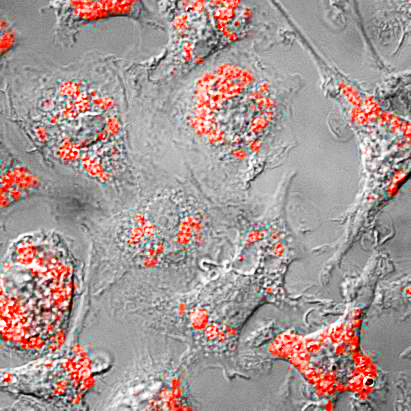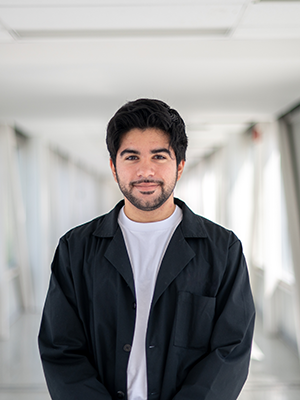Student researcher helps in the battle against antibiotic resistance

By Shelby Paulgaard
 Macrophages (cells used by the immune system to destroy bacterial cells) battling drug-resistant Staphylococcus aureus (marked with red). Photo courtesy of David Heinrichs
Macrophages (cells used by the immune system to destroy bacterial cells) battling drug-resistant Staphylococcus aureus (marked with red). Photo courtesy of David Heinrichs
It’s a tug of war – a constantly evolving battle between antibiotics and the bacteria they are designed to kill.
And experts say bacteria are winning.
But a dedicated team of researchers at Schulich School of Medicine & Dentistry are laser-focused on what seems like an impossible task: Creating drugs to fight – and win – the war against antibiotic-resistant bacteria.
Inside the Heinrichs Lab, David Heinrichs, PhD, and his team investigate disease-causing bacteria to determine which genes are important for their survival within a host. This information can help lead to new treatments for infections that do not respond to antibiotics. It can also play an important role in vaccine development.
“We’re in a period of time that is called the drug discovery void,” said Heinrichs, a professor in the Department of Microbiology and Immunology. “The bacteria have continued to evolve, and we’re getting to a point where soon we may not be able to treat some infections.”
When bacteria become antibiotic-resistant, traditional drugs are unable to treat infections, which can spread and worsen. Heinrichs’ team studies a germ called Staphylococcus aureus, which is the leading bacterial cause of skin and soft tissue infections.
Strains called methicillin-resistant Staphylococcus aureus (MRSA) are typically resistant to multiple drugs and spread easily. Bacteria evolve quickly, which means strains may become resistant to new drugs before they can even be introduced into clinical trials.
 Alex Sheikh
Alex Sheikh
“Dealing with bacteria is always kind of an arms race; when our immune system has a way of restricting them, they evolve ways to get around it. When we develop a new antibiotic, they evolve ways to resist it.” said Alex Sheikh, a recent graduate of the Bachelor of Medical Sciences (BMSc) program and part of Heinrichs’ team. Sheikh’s research focuses on iron uptake, an essential process for MRSA’s survival in the human body.
Sheikh specifically looks at identifying new genes involved in iron uptake, and the ways in which MRSA coordinates the expression of those genes based on nearby environmental cues like iron availability and immune cell attack. Bacteria and the immune system are in a constant battle, and both have tools to fight for survival in the body.
As researchers determine which mechanisms bacteria are using to avoid being killed – both by the immune system and by antibiotics – they learn more about how bacterial infections can be treated. Understanding these mechanisms can also help with the production of an MRSA vaccine.
“The most interesting part for me about infectious disease has always been the tug-of-war between the host and the bug,” said Sheikh. “What excites me about the research is that, despite all that we know, there’s still so much more to uncover because bacteria are always adapting.”
When he started his career journey, Sheikh planned to go to medical school, but his interest in research grew after an internship with Agriculture and Agri-Food Canada last year.
“Before starting my research last year, I thought I wasn’t cut out for this kind of work. But now, I'm proud of what our team has achieved and find the work very fulfilling,” said Sheikh.
“The most interesting part for me about infectious disease has always been the tug-of-war between the host and the bug,...What excites me about the research is that, despite all that we know, there’s still so much more to uncover because bacteria are always adapting.” -Alex Sheikh
As part of his internship experience, Sheikh spent a year studying emerging pathogens in a watershed near Ottawa, conducting experiments to determine antibiotic resistance. His research focused on developing tools to rapidly detect bacteria in environmental or clinical samples and assess their potential disease-causing abilities and was published in the scientific journal Letters in Applied Microbiology.
Sheikh said he initially took interest in microbiology because bacteria reminded him of Poké mon characters. He admires how each species of bacteria requires particular conditions to survive and has specific mechanisms for fighting drugs and the immune system. Sheikh wants to learn more about these conditions to better understand how to defeat antibiotic-resistant superbugs.
After his internship, Sheikh began to open up to the possibility of research work as a career. Now, he will continue to explore that possibility as a Master’s student in the Heinrichs lab.
“I thought research was something inaccessible to me,” he said. “[My work in the Heinrichs Lab] made me realize there was a place for me in that world.”
While he is still considering medical school, Sheikh is not restricting himself to one path for his future. Serving as vice president of Communications for Active Minds, a Western University club focused on mental health awareness, helped Sheikh be more open to changing his career trajectory.
“Increasing my mental health literacy by being a member of the club made me introspect a lot more,” said Sheikh. “I’m working on coming to terms with my path not being as linear as I would have hoped and no longer tying my intrinsic value to how I perform.”
Sheikh has also enjoyed success outside of the lab. Alongside his research, he has mentored other students through both the Western Biochemistry Club and the Microbiology and Immunology Student Association’s mentorship programs. Most importantly, with his newfound love of research, Sheikh has opened up to exploring a wide variety of career opportunities.
“While my career has taken me in a different direction than I originally envisioned for myself, I am gaining a lot of valuable experience and now have an open mind to new possibilities.”









